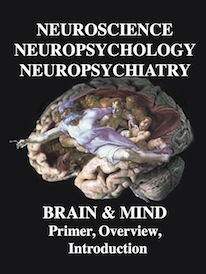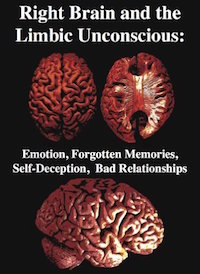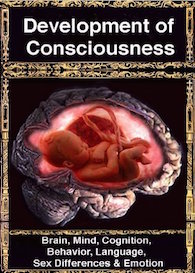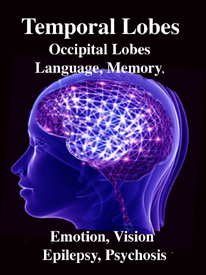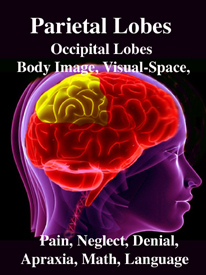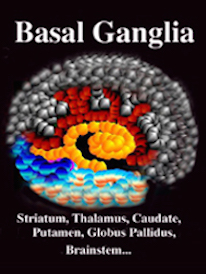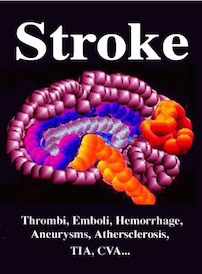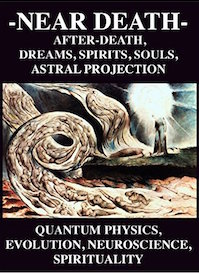Rhawn Gabriel Joseph, Ph.D.
BrainMind.com
THE INTERPRETATION OF DREAMS
"In sleep and in dreams we pass through the whole thought of earlier humanity....as a man now reasons in dreams, so humanity reasoned for many thousands of years when awake....This atavistic element in man's nature continues to manifest itself in our dreams, for it is the foundation upon which the higher reason has developed and still develops in every individual. Dreams carry us back to remote conditions of human culture and afford us a means of understanding it better" --Nietzsche
DREAMING ON THE RIGHT HALF OF THE BRAIN
Sleep consists of five distinct stage, one of which, paradoxical or active sleep, is closely associated with the appearance of dreams. It is during the course of the dream that the eyes begin to move quite rapidly as if the dreamer were observing some action. This is referred to as REM, rapid eye movement and the appearance of REM during sleep has been found to occur in a rhythmical fashion in all terrestrial mammals.
In addition to REM, during the course of a dream temperature control is lost, pain sensation is rare, males tend to have an erection, motor functioning is all but abolished except in certain regions which control respiration, and eye movements, and the sensory reception is greatly attenuated. Many of these changes appear to be due to alterations within certain limbic nuclei such as the hypothalamus and amygdala. The amygdala as well as the basal ganglia also appear to be involved in the cessation of motor activity as well, and this makes sense, otherwise an animal or person might act out their dreams. Hence, a complex alteration in activity occurs here so as to prevent activity during dreams. Nevertheless, the inhibition of motor activity appears to be predominantly the function of certain nuclei located in the brainstem, through which the pyramidal tract passes on it's way to the spinal motor neurons. When these particular brainstem motor inhibitory neurons are surgically destroyed, animals will get up and walk around during REM and seemingly act out their dreams. And what do they appear to be dreaming of? Generally the stalking of prey or the need to defend themselves against threat of some sort.
REM is characterized by alterations in activity within the certain nuclei located in the brainstem including what has been referred to reticular activating system, the hypothalamus, the lateral geniculate and dorsal medial nucleus of the thalamus (which is under the control of the frontal lobes and is involved in the gating of information destined for the neocortex), and the occipital lobe and inferior temporal regions including the amygdala and hippocampus. Many neurons in these brain areas become active during REM and these have been referred to as REM on cells. Other cells which decrease their activity during REM are referred to as REM off cells.
In addition, several major neurotransmitters have been postulated to be involved in the production of REM and that includes norepinephrine and serotonin which are believed to inhibit REM on cells, and cholinergic neurotransmitters which activate the REM on cells. In fact, cholinergic transmitter activity has been positively associated with REM and what has been referred to as PGO waves; i.e. enhanced activity within the pons of the brainstem, the lateral geniculate nucleus and the occipital lobe --the latter of which are involved in visual perception. Conversely, disruption of serotonin levels not only increases PGO and REM, but can result in vivid hallucination when waking. Indeed, this is one of the actions of LSD which inhibits serotonin release and transmission. Hence, fluctuations in the amount of serotonin and norepinephrine appear to be highly involved in the transition from NREM to REM and thus in the production of dreams. However, these neurotransmitters are found throughout the brain and limbic system and in certain regions they may act to inhibit and in others they may act to increase cellular activity.
Hence, overall it appears that the production of dreams are directly related to changes in neurotransmitter levels and thus the neuroexcitability of brainstem, limbic, thalamic, and neocortical structures which in turn induce alterations in conscious awareness. However, these alterations do not occur equally throughout the brain. For example, it has been found that when the rapid eye movements are toward the right that alterations in activity of the right half of the brainstem and the thalamus, as well as right sided levels of REM related neurotransmitters are also more pronounced. These alterations also appear to occur within the cerebral hemisphere as well. That is, when one half of the brain is deep asleep, the other half functions sometimes just below the surface of alertness, or more commonly, somewhere between light sleep and deep sleep.
It also has also been reported that electrophysiologically the right hemisphere becomes highly active during REM, whereas, conversely, the left brain becomes more active during N-REM. Similarly, measurements of cerebral blood flow have shown an increase in the right temporal and parietal regions during REM sleep and in subjects who upon wakening report visual, hypnogogic, hallucinatory and auditory dreaming (Meyer et al., 1987).
Interestingly, abnormal and enhanced activity in the right temporal and temporal-occipital area acts to increase dreaming and REM sleep for an atypically long time period. Similarly, REM sleep increases activity in this same region much more than in the left hemisphere (Hodoba, 1986), which indicates that there is a specific complementary relationship between REM sleep and right temporal-occipital electrophysiological activity.
DAY DREAMS, NIGHT DREAMS, AND HEMISPHERIC OSCILLATION. There is some evidence to suggest that during the course of the day and night the two cerebral hemispheres oscillate in activity every 90 to 100 minutes and are 180 degrees out of phase --a cycle that corresponds to changes in cognitive efficiency, the appearance of day dreams, REM (dream sleep), and, conversely, N-REM sleep. That is, like two pistons moving up and down, it appears that when the right brain is functionally at its peak of activity, the left brain is correspondingly at its nadir.
Similarly, shifts in cognitive abilities associated with the right and left hemisphere have been found during these cyclic changes during the day and after awakenings from REM and NREM sleep. That is, performance across a number of tasks associated with left hemisphere cognitive efficiency is maximal during NREM, whereas, conversely, right hemisphere performance (e.g., point localization, shape identification, orientation in space) is maximal after REM awakenings. Moreover, Bertini et al., (1983) found that left hand motor dexterity (in right handed subjects) was superior to the right when awakened during REM and that the opposite relationship was found during NREM, i.e. right hand superiority.
Conversely, there have been reports of patients with right cerebral damage who have ceased dreaming altogether or to dream only in words. On the other hand it has been reported that when the left hemisphere has been damaged, particularly the posterior portions (i.e. aphasic patients), the ability to verbally report and recall dreams also is greatly attenuated. Of course, aphasics have difficulty describing much of anything, let alone their dreams. However, with severe and profound lesions to the frontal lobes, such as following a frontal lobotomy, not only the ability to dream, but to day dream and fantasize is abolished.
As will be explained in detail in the next chapter, the frontal lobes act so as to inhibit the transmission and processing of information within the rest of the cerebrum. The frontal lobes are also associated with the conscious and unconscious aspect of the Ego. The Ego often acts as a mediator so that some impulses can be expressed and fulfilled but in a manner that is acceptable to both halves of the brain and the limbic system. One might presume that the frontal lobes, and thus the Ego (at least as conceptualized here), would also play a role in the formation of dreams. In this regard it is noteworthy that frontal lobe damage not only can results loss of restraint such that a person acts on their impulses without regard for consequences. Is it possible that with removal of the frontal lobes and thus the Ego, that the need for impulses to be disguised during sleep in the form of a dream is also abolished?
Nevertheless, although the frontal lobes play a significant role, it appears that the right hemisphere provides the physiological foundation from which dreams in part derive their source and origin. However, in some instances in which these dream centers are disconnected from the language dominant left hemisphere, due to posterior right or left hemisphere lesions or after callosotomy, the ability to recall, report, and/or to produce vivid visual and hypnogogic dream imagery is attenuated.
THE INTERPRETATION OF DREAMS
..Now Israel loved Joseph more than all his children, and he made him a coat of many colors... ...and Joseph dreamed a dream and he told it to his brethren... for behold we were binding sheaves in the field and lo, my sheaf arose, and stood upright: and, behold, your sheaves stood round about, and made obeisance to my sheaf. And his brethren said to him. Shalt thou indeed reign over us? And they hated him yet the more for his dreams...
...And it came to pass at the end of two full years, that the Pharaoh dreamed: and behold, he stood by the river and seven well favored kine and flatfish came up out of the river and they fed in a meadow. And behold, seven other kine came up after them out of the river, ill favoured and leanfleshed. And the ill favoured and leanfleshed kine did eat up the seven well favoured and fat kine. So Pharaoh awoke. And he slept and dreamed the second time.... ...And it came to pass in the morning that his spirit was troubled and he sent and called for all the magicians and wise men of Egypt...but there was none that could interpret the dream...
....And Joseph said unto Pharaoh, God hath showed Pharaoh what he is about to do. The seven good kine are seven years.... and the seven thin and ill favoured kine that came up after them are seven years... Behold, there come seven years of great plenty throughout all the land of Egypt: And there shall arise after them seven years of famine: and all the plenty shall be forgotten and the famine shall consume the land....
DREAMING: WHAT'S THE MEANING OF THIS?
Although dreams probably serve a number of purposes, and at times are highly improbable and bizarre, they often reflect something significant about the mental and emotional life of the dreamer, as well as other issues of concern to the right half of the brain. For example, when subjects are awakened repeatedly during REM over the course of several days, often an evolving thematic pattern, like an unfolding story, can be discerned. These patterns frequently reflect mental-emotional activity concerned with the solution of particular problems. In fact, when one considers all the multiple forms of social communication one experiences during the course of the day, e.g. touch, body language, olfaction, etc., and all that these messages may impart regarding not only the present, but one;s future intentions, dream may well act to explain and instruct as to what has been concluded, as well as to predict the future based on what it has been perceived.
Consider the day dream. In addition to its images and memories, for the most part the fantasy produced consists of anticipations regarding the future and in this respect they could be considered as imaginal means of preparation for various possible realities.
Indeed, among ancients these influences were seen as extremely important sources of information, not just regarding the past or the world of souls and spirits but the future as well. As possible harbingers of the future they had to be observed most carefully.
Hence, ancient and modern "savages" often paid considerable attention to their dreams which might not only hold important information regarding an individuals personal future but the future of his friends and family. However, every one in a while someone would have what is called "a big dream" which are of importance to the whole clan or tribe. Often the man having the dream would gather the others together and announce it. Such dreams were not only fashionable throughout the ancient civilized world, but continued to be announced as recently as the middle ages in Europe. Such dreams were taken seriously by such highly sophisticated and cultured ancient societies as found in Greece and Rome and were still being announced two thousand years ago in the Roman Senate. On one occasion a senators daughter had a dream in which Minerva the Goddess appear and complained that her temple was being neglected by the Roman people. The dream was announced to the Senate which in turn voted funds for restoration of the temple. However, as might be expected, such dreams are rare and few people have them. Of course, among modern, enlightened human beings, dreams are seldom given much importance.
RIGHT BRAIN INFLUENCES ON DREAM CONTENT
The right half of the brain as has been noted, is dominant in regard to most aspects of non-verbal perceptual activity as well as the expression and comprehension of social-emotional nuances. It is for this reason that the right brain is sometimes thought to be the more intuitive half of the cerebrum. The right brain is thus able to draw conclusions, make predictions, selectively store certain images and experiences in memory, and can call on and act on these information stores at will. Moreover, given its sensitivity to a host of non-social environmental variables, it is able to assimilate and draw conclusions if not make predictions about this material as well. In this regard, it is not at all surprising that during the course of a dream, when the right half of the brain is at a peak level of activity, that these concerns, anxieties, emotions, memories, as well as conclusions and predictions regarding events and people of varying importance will be conjured up.
However, the right half of the brain may also respond to the reception of a sensory impression during the dream by trying to explain it in dream images, similar to what occurs in the production of primary imagery and the primary process (what Freud referred to as "wish fulfillment." For example, the person is hungry so they dream of eating a delicious meal. However, dreams can also warn us of our internal state.
A case in point, we dream we are walking in San Francisco and notice some kids jumping around in a puddle so we step aside to keep from getting wet. We then observe that it is a fire hydrant from which the water is emerging and suddenly we are in a store drinking a glass of water and we feel the water spilling down our chin onto our lap. As we stand up we notice that it is now raining outside and that we are outside in danger of being soaked and turn to dash off to safety....when all at once we awake and rush to the bathroom, seeking relief from an expanding bladder.
Dreams can also explain faint sensory impressions that arise from the external and internal environment. We are walking down the street and see a dog running along, its collar jingling. We walk around the corner and see an ice cream truck, and as we are hungry we reach into our pocket and as the truck gets closer we see the driver ringing a bell which gets louder and louder until we finally wake up and discover someone ringing the door bell. In this regard, the hearing of the bell seemed to be a natural part of the dream, and it is which the right brain attempted to explain. What seems paradoxical, however, is that the dream seemed to lead up to the bell so that its ringing made sense in the context of the dream.
The dream did not lead up to the bell, however, for the bell initiated the dream. The dream was produced, so as to explain in the unique language of the right brain during sleep, the sound of the bell. The bell was heard and the dream was instantly produced in explanation and association. Since most dreams often last only a few seconds (although they may seem to take place over the course of hours) and since the right brain does not analyze in temporal and linear units, the sequence of events is not all that important, that is, to the right half of the brain
. Indeed, this is just yet another reason why dreams often do not make sense to the left half of the brain and conscious mind. The non-sequential, simultaneous and parallel arrangement of the dream is not comprehensible to the left brain which is dependent on temporal-sequential language for understanding. Indeed, it is due to the non-temporal, often gestalt nature of dreams which require that they be consciously scrutinized from multiple angles in order to discern their meaning, for the last may be first and what is missing may be just as significant as what is there.
Fortunately, backward dreams are the most easily comprehended because the left brain recalls the dream from its ending forward, and then like a reflection from a mirror reverses all that is perceived so that it makes temporal-sequential sense.
One noted dreamer dreamt he was in 18th Century France in the midst of the French Revolution. After a trial in which he was been found guilty he was being led down a street lined with yelling and cursing Frenchmen and women on either side. At the end of the street were the gallows where he could see the heads of various political criminals being chopped off at the neck. Mad with fright he felt and saw himself led up the stairs and his head being placed in the yoke of the chopping block. The executioner gave the signal, the crowd screamed its approval, he could hear and sense the blade falling and with a loud crack it struck him across the neck with such a jolt that he awoke to find that his poster bed had broke and that a railing had fallen and struck him across the side and back of his neck.
Nevertheless, the left brain makes a contribution to the production of dreams as well. That is, just as the right brain is responsible for the visual, pictorial, emotional, hypnogogic aspects of dreaming, the left brain too mediates a peculiar form of dream activity; the dreaming in words and thoughts. Hence, just as the left brain mediates language and the production of verbal thoughts, it is also responsible for producing much of the verbal commentary that accompanies visual dream imagery. If as part of a dream, we are speaking to another person and we hear that person talk and understand what they say, this is made possible by the left brain. The right brain cannot understand complex conversations, even that which occurs during a dream. Hence, the left brain, although at a low level of arousal, is still able to function to a limited degree and thus provide the speech we hear and speak while dreaming. Moreover, like the ego-centric child, the left brain participates, comments, and explains the activity initiated and maintained by the right half of the brain during sleep as well as during waking. Otherwise we would not understand what people say as part of our dreams. The verbal monologues produced by the left brain as an accompaniment to the visual dream produced by the right brain may in fact trigger even more dream material.
Moreover, just as verbal thoughts and the production of verbal commentary can be stimulated by the right hemisphere during waking and dreaming, the left brain can stimulate the production of right brain dreams and thoughts. That is, the right brain and the unconscious mind, often attempt to interpret and analyze not only what is occurring socially and emotionally but attempts to put into action ideas and thoughts generated by the left brain as well. It is due to these forces that creative solutions suddenly burst forth into the conscious mind, or problems are probed or solved by dream imagery.
Nevertheless, just as we might have silly thoughts or think about mundane events of little importance, our dreams are sometimes just as silly and mundane. In fact, sometimes in the process of dreaming, the brain regurgitates the most readily available impressions some of which are of little emotional or intellectual significance and are based on fleeting occurrence that occurred during the day we have our dream.
For example, I am dreaming that I am in my back yard talking to my dentist and two of his female assistants. We are observing my two dogs, Jesse and Sara. As Sara passes us by she suddenly stands up on her hind legs and begins to walk in a manner identical to a human. At this point, one of the women says, "That's sexual harassment," and then the other says, "No, she has no pockets." At this point Sara suddenly comes to be dressed in formal black tie dinner clothes, complete with cane and boller hat....
What is the source of this dream? That day as I sat in the dentist chair talking with him and his two female assistants, somebody joked that one of the assistants could tell how much money I had by just rubbing my pocket. Later, I was talking about human evolution and made the statement that if humans had evolved from dogs, we would have been a kinder, sweater breed of people. I then added, given the manner in which dogs sometimes greet each other by sniffing each other's genitals, no one would know for sure if they were a victim of sexual harassment. Someone then remarked that it would depend on how they were dressed.
As argued in depth by Jung and as alluded to by Freud, not all dreams are related to wish fulfillments, the interpretation of sensory impressions, or the replay of recent or even past experience. Presumably some dreams contain very archaic elements which seem to have absolutely no bearing on the dreamers personal experience but which consists of ancestral memories and archetypes, the residue of ancient impressions and profound experiences that somehow became litteraly etched into the mind and brain of human beings. Given the great antiquity of the brainstem, midbrain, and limbic nuclei, all of which greatly contribute to dream production, it is certainly possible that somehow, such impressions exist.
When I was a child my parents and I frequently spent time at the beach, in Santa Cruz California. Although the water was cold, I loved to wade and body surf, often sitting upon an inner tube or diving beneath the waves with my eyes open so that I could see what was underneath. The very first dream that I can recall ever having experienced, which was around age 3, concerned the beach and the ocean: I am running toward the water when giant clouds form on the horizon. Suddenly the ocean begins to rapidly withdraw and recede for miles and giant sea shells, fish, and other aquatic creatures are exposed. I am absolutely thrilled, amazed, and overjoyed, and run out to inspect all that the ocean had hidden beneath its depths. Suddenly I hear people yelling and screaming and everyone is running from the beach and I turn and can see the ocean rapidly returning as one giant wall of water. I become frightened and try to run away too and as the water is about to wash over me...then I awaken.
I had this dream several times as a child, and then one more time about 20 years later. This time I was with a friend, a graduate student whose knowledge and interest in the brain had intrigued me. When the waves receded, we ran out onto the sand and together picked up sea life, shells, and then found a chest, which when opened, was filled with jewels, gems, books, and scrolls. Knowing that the water was going to return, I warned him and together we hauled the chest back to the shore and then I woke up.
I had for many years interpreted these basically similar dreams as reflecting my interest in the unknown and the mysterious, and perhaps my desire to explore beneath the surface of all experience so as to gaze in wonder at the contents of the unconscious. However, approximately 20 years after I had that first dream, I watched a video tape of the ocean receding for miles such that fish, shells and other sea life were exposed. I was watching the unfolding of a Tsunami. A Tsunami! results when an approaching hurricane sucks up the ocean causing it to recede from the shore and various inlets, only to come crashing back as the hurricane approaches. I do not believe I knew this as a 3-year old child and was rather astounded to discover this later in life.
Hence, what might be the true interpretation of my dream? Ancestral memory? Reflection of my interest, even as a child, of the unconscious? An extrapolation of my desire to see what was beneath the waves and thus I wished away the ocean only to have it crash back down on me?
In the late 1980's, a young woman's car was found abandoned on the side of a mountain road leading to Santa Cruz. For over a week stories on the missing woman were run by the newspapers and on television. Finally, another woman called the police. She said she had a dream where the missing woman appeared to her, showed her her car, and then led her across the road and then down to a hidden path. At the end of the path was a huge rock and on top of the rock was the dead woman's body. And then she awoke.
After telling the police her dream, they took her to the spot where the car had been found, and she indicated it was the same spot as in the dream. She then led them across the road and then based on her recollections from the dream, to the hidden path. At the end of the path was a big rock and there was the body. The police did a thorough investigation and they were forced to accept that the woman who had the dream indeed had almost no knowledge of the case, did not know the woman, her friends, or the place where the car had been left, was not at all familiar with the forested mountains of that area, and in fact, her only relation to the crime or the victim, was the fact that she had this dream.
Where do such dreams come from? That I cannot speculate on here except to note that such occurrence are not all that rare and that the police have generally learned to take such information seriously.
Nevertheless, it might reasonably be asked, if some dreams are of importance and not merely reflective of random and purely confabulatory ideation, why are most people so willing to dismiss them and why are they so difficult to recall? In part, as noted in the introduction to this section, this may be a function of lateralization, alterations in hemispheric arousal and activity, differential memory storage, and decreased interhemispheric communication during REM. Perhaps they only can be recalled by the right hemisphere. In any case, dream memories are also stored differently from waking memories because if the two were stored together, a person would be unable to recall what had occurred in the dream vs waking life.
EVOLUTIONARY DIGRESSIONS
It could also rightfully asked that if indeed dreams once held the powers and the ability to convey important predictions and meanings, such as that of the big dream, why is it now that such occurrence are such a rarity? Or are they? That is, accepting the possibility of the validity of such occurrence only for the sake of an amusing argument, what has become of these amazing capabilities including the widespread ability to experience the mystical, magical, and of fairies, spirits, and lost souls?.
Certainly, the remnants of such abilities and beliefs are everywhere evident. One need look no further than their daily newspaper to find their horoscope preding their day and planning their future, and most people today still have "superstitious" and are afraid or at least respectful of the notion of ghosts. One need look no further than organized religion to seek the relics of what at one time had been witchcraft and sorcery performed by shamans, witch doctors, medicine men, and the like. However, if at sometimes in our history some people, certain people had such powers, the question might be, what has changed in the brain so that these abilities have been lost or diminished?

Neanderthal vs Cro-Magnon
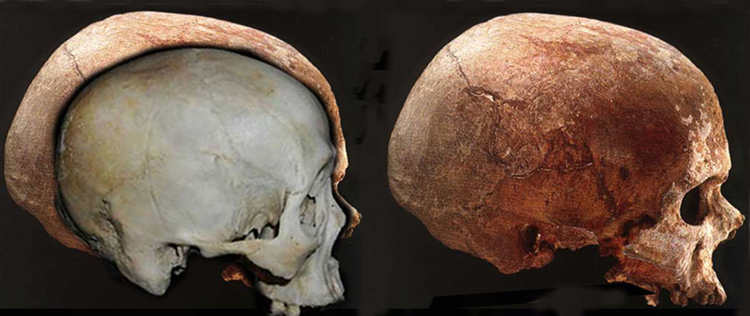
Human Skull Superimposed on a Cro-Magnon Skull
With the development of agriculture, a tremendous change in the diet of human beings occurred such that they traded the high protein, expensive caloric well balanced diet of hunters and gatherers for the cheap calories of corn and wheat. In consequence, although there was more food to support more people, new nutritional diseases appeared and man lost almost half a foot in height --a loss which has only been regained in the last 100 years.
Man not only grew smaller but certain regions of his brain also decreased in size. The brains of Cro-Magnon man (who left evidence of having lived anywhere from 100,000 to 10,000 years ago) and that of Neanderthal man (who left evidence of having lived from 130,000 to 30,000 years ago) were similar in many respects with the exception that the frontal lobes of the Cro-Magnon brain greatly expanded which n turn gave the Cro-Magnon a tremendous advantage over their lesser equipped cousins. However, the temporal, parietal and occipital regions remained similar in size and (and as compared to modern man) quite large in order to enable them to survive among the sensory elements and to analyze this information correctly so as to have success not only during the hunt, but to find the best gathering areas as well.
With the change of life from hunting and gathering to a sedentary life more cut off from nature, i.e. farming, the sensory environment became less important as did mans ability to successfully maneuver in space. To have tremendously developed capacities n this regard were no longer as relevant and hence selective pressures were geared elsewhere. As such, although the frontal lobes remain large, all other neocortical areas in fact decreased in size.
Moreover, the agricultural revolution brought a harder life, a shorter life span, malnutrition due to dependence on crops and crop failures, starvation, and infectious diseases, including tooth loss, abscesses, and cavities. Indeed, cholera, leprosy, and tuberculosis did not appear until farming. This is because a hunting gathering way of life provides a wide variety, in adequate amounts, of minerals, vitamins, and proteins, whereas crops are usually starchy in content and contain so called cheap calories. Men lost over half a foot in height and dropped from 5 ft 10, to about 5 ft 2. In fact, it has only been within the last 100 years that men and women have grown back toward their original heights.
In consequence, those areas of the brain has grown smaller and thus the brain of modern man, although well equip[ped with the same sized frontal lobe of the Cro-Magnon, has experienced a diminishment in the size and representation of other cortical functions concerned with sensing the environment.
In other words, just as the world of smell is much more rich and tremendously more complex in that of a dog who has a larger region of his brain devoted to these functions as compared to humans, so too was the world of the Cro-Magnon and their descendents,who enjoyed a richer sensory perceptual experience as compared to the majority of most modern humans today. It is important to note, however, that one area of the brain did not diminish in size but is equal to that of any Cro-Magnon. This is the frontal lobe, the senior executive of the brain and personality.
THE DREAM OF DREAMING
Tiny rivulets of sunlight poked through the foliage and streamed down through the thick overhanging branches and swaying leaves only to splash upon the rocks and debris of the earth below. The warming sunlight felt so soothing on his face and arms that it almost made him feel sleepy. Everything was so quiet, even the wind which gently propelled the clouds overhead and caused the branches of the trees to sway and shadows to dance almost hypnotically across his face. Evergreen and cypress, fir and pine....it was like...it was like....
Plucking a twig from a huge green bush, he plied it playfully between his fingers as he stepped into the clearing and onto the well trodden path which led to the edge of town. The sudden brightness of the sun, like a giant blood red orb tossing orange streaming rockets of light into the sky, was momentarily disorienting. In the distance he could hear laughter and the chattering of voices sailing to him in snatches through wind and over meadow. There was something.... something, he thought, trying to figure out what was bothering him, and then a loud laugh made him whirl about. Was there someone watching him?
Quickening his pace he soon stepped onto the cobbled street and glanced at the quaint little shops which lined the familiar roadway. Rubbing his chin and looking about at the strange yet familiar buildings, a feeling of disorientation again washed over him. Feeling hungry he reached slowly into his pants pocket all the while trying to remember. He knew there was a little cafe somewhere around the corner. If he could just get a bite to eat it would give him a chance to collect his thoughts.
Walking hesitantly, concern creasing his brown, hands now searching his remaining pockets, he looked about uncertainly, eyes blinking in the cruel sun. He didn't seem to have any money. And his wallet? Where was his wallet?
Feeling again as if he were being watched, he glanced up and spied an older, heavy set woman, a young blond child tugging at her arm, staring at him in a most peculiar manner. A sting of pearls hung loosely from her neck and she held an old fashioned lorgnette through which she peered at him most disconcertedly as she waddled across the street. The child wore a little blue square sailors hat and carried a short fishing pole. For a brief moment he thought he recognized her. It looked like.... But no. And the child. But then, looking again, he realized it wasn't a child at all but a big dog with a fish in its mouth.
Little bands of sweat began to bead up and roll down his forehead and he closed his eyes tightly. The sounds of the street, of voices, townspeople, shop keepers, children laughing, laughing, seemed to grow louder. Were they laughing at him? Opening his eyes he was surprised to find an older, balding man wearing spectacles and a captains sea cap, staring at him. Why, it was.... but the old man suddenly frowned, turned crisply away and then he was gone.
"What the..." he said out loud, feeling confused, angry, and increasingly anxious. The emptiness of his stomach was also bothering him. He just had to get something to eat. Why, he hadn't eaten in... in... Patting his shirt pockets, his brow knitting together, he tried to remember as a sea gull began to cry overhead.
There was no money, no papers.... nothing... nothing except some tiny grains of sand and a single shiny piece of paper with some writing on it. Rotating it slowly, the glare of the sun reflecting from its surface, he tried to make out the words but they didn't seem to make any sense. Glancing up and down the quaint and rural boulevard he scanned the various signs and names of the shops and stores, but, like the paper, he couldn't quite make out what they said. Had he lost the ability to read?
Glancing anxiously to and fro he suddenly realized that he really didn't know this street after all. Although it seemed familiar, it wasn't. Everything was wrong. Buildings were where they shouldn't be, people looked like who they weren't. Where was he?
His pulse quickening, a sudden wave of fear washed over him. He didn't know where he was. Swaying slightly, his eyes closed, he could feel the heat of the sun and the growing fear. "Think. Think," he mumbled, feeling increasingly confused, uncertain and panicky. "Think," he said again, closing his eyes, trying to remember. The street, the faces, the signs... but it was more than that. Something horrible. A cold sense of steely terror crawled up his spine and his heart began to thump wildly in his chest. He couldn't remember... He didn't know who he was! The laughter of children rang wickedly in his ears.
Snapping up his head, looking fearfully up and down the street, he fought the impulse to run and cry out. He needed help. Glancing about wildly, he practically tripped over his feet as he stumbled down the pavement.
"Can you help me?" he cried out frantically, his eyes wide with fear as he approached an old man with a flowing white beard carrying a briefcase and an umbrella. "I, uh... I don't know who I am!" he gasped.
The old man gave him a piercing look and then laughed. "Why, you are who ever you want to be," he called over his shoulder as he quickly walked away.
"Who ever I want to be?" he repeatedly confused and feeling dizzy with fright, his breath coming fast, heart beating heavily against his chest.
He closed his eyes tightly and fought the tears that he could feel welling up behind them. "This has got to be a nightmare," he reasoned, "a bad dream," he told himself as his pounding heart sent blood whooshing through his ears creating a symphony of sound that served only to confuse him more.
After what seemed like a long long time, he finally opened his eyes and stared up into the blue blue blueness of the mid day, and could sense tiny rivulets of sunlight splashing upon his shoulders and back. The warming rays were so soothing and everything seemed so still.
The afternoon was cloudless, the sky an empty mirror, except for the bright orb which seemed to stare down at him like a giant uncaring eye. Increasingly he became aware of the quiet and the nothingness. And then looking around, the fear washed over him anew. Where but moments before there had been shops and children, signs and streets, there was now but a single stretch of nothingness which stretched everywhere and nowhere.
"What is happening to me?" he cried out to the indifferent sky as the tears burst forth from behind his eyes. Falling to his knees he began to sob. "This is got to be a dream. A nightmare. I got to wake up. Wake up! Wake up!" he implored loudly beating at his head and eyes.
And then, through the tears, he saw it, looming larger in the distance. It was an old man, a large wooden staff in his hand, walking slowly toward him.
Losing control he jumped to his feet and tried to run toward him, but his legs seemed wooden and the earth like a molasses which sucked at his feet. Finally, he cried out, "help me," to the old man as he drew near. The old man looked familiar... like his father... like his son....like... The old man raised his staff and stared at him curiously and then smiled.
"Please," he cried out. "you've got to help me. I think I'm going crazy. Everything is going crazy. Nothing is making sense...."
"Calm yourself, my son. All is well. All is as it should be," the old man replied.
Blinking away his tears, he stared pleadingly at the old man and then noticed that it wasn't a staff, but an oar that he carried. Shaking his head miserably he mumbled again, "this is crazy. This is like some nightmare... like some crazy insane dream."
The old man smiled again. "It is a dream, my son. All of life is but a dream."
Glancing up at the old man, he noticed that he was dressed like some ancient mariner, a gold ring hanging from his ear, his white beard flowing. Was it sea gulls he heard overhead?
"A dream?" he finally replied still feeling afraid and confused. "This is all a dream?" he asked, looking from side to side.
"Just a dream." the old mariner repeated. "Life is but a dream. That's why everything seems to change, and why what is becomes what isn't and what isn't becomes what is."
"You mean I've really been dreaming all this? I've been making everything come and go and disappear? This has been all my doing? It's just a crazy dream?"
The old man nodded. "Just a silly dream."
"Then why are you still here?" he asked, suddenly recognizing the old man and feeling faint.
"Because... I am dreaming you!" the old man replied to the anguished but rapidly disappearing form. P>
